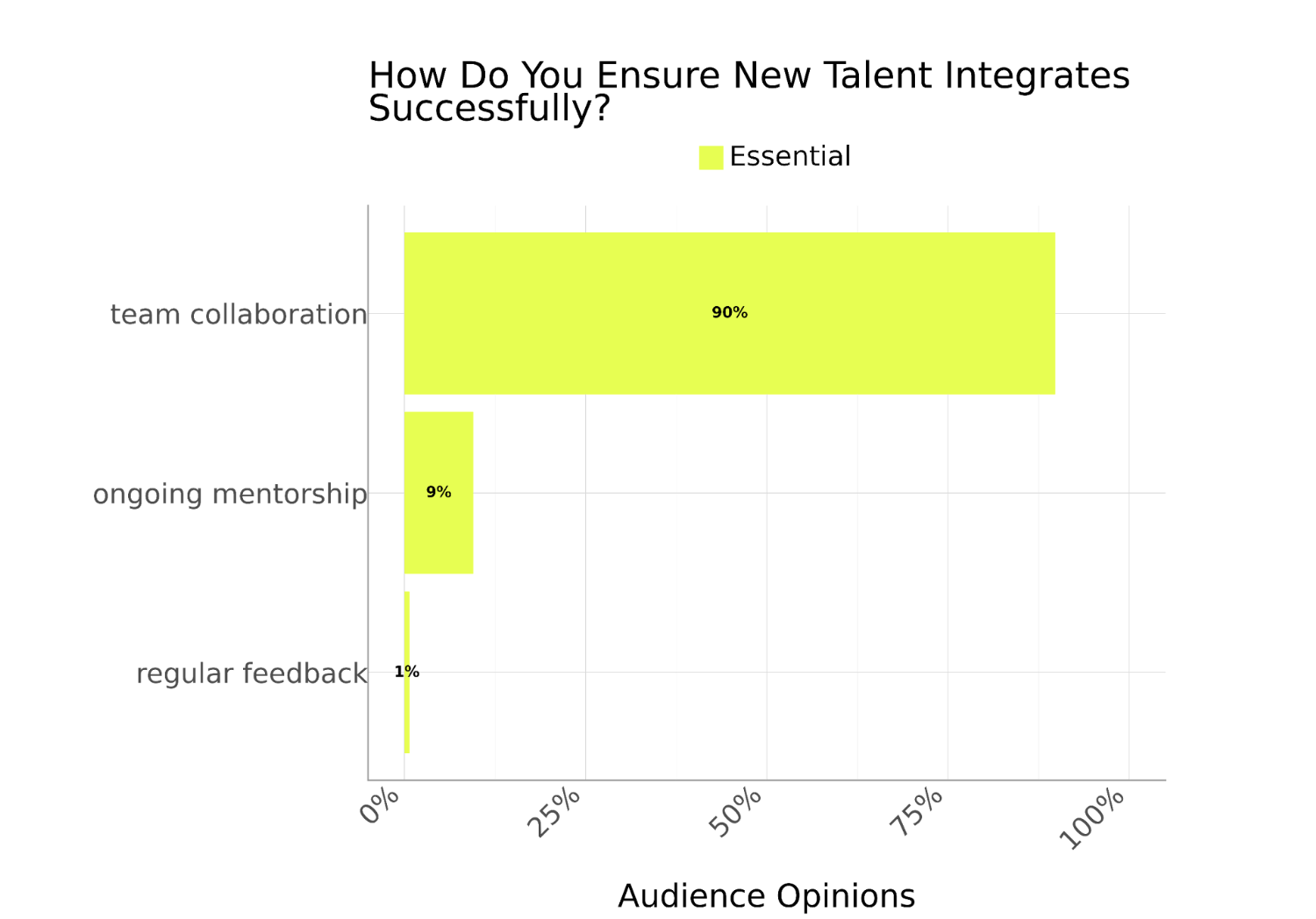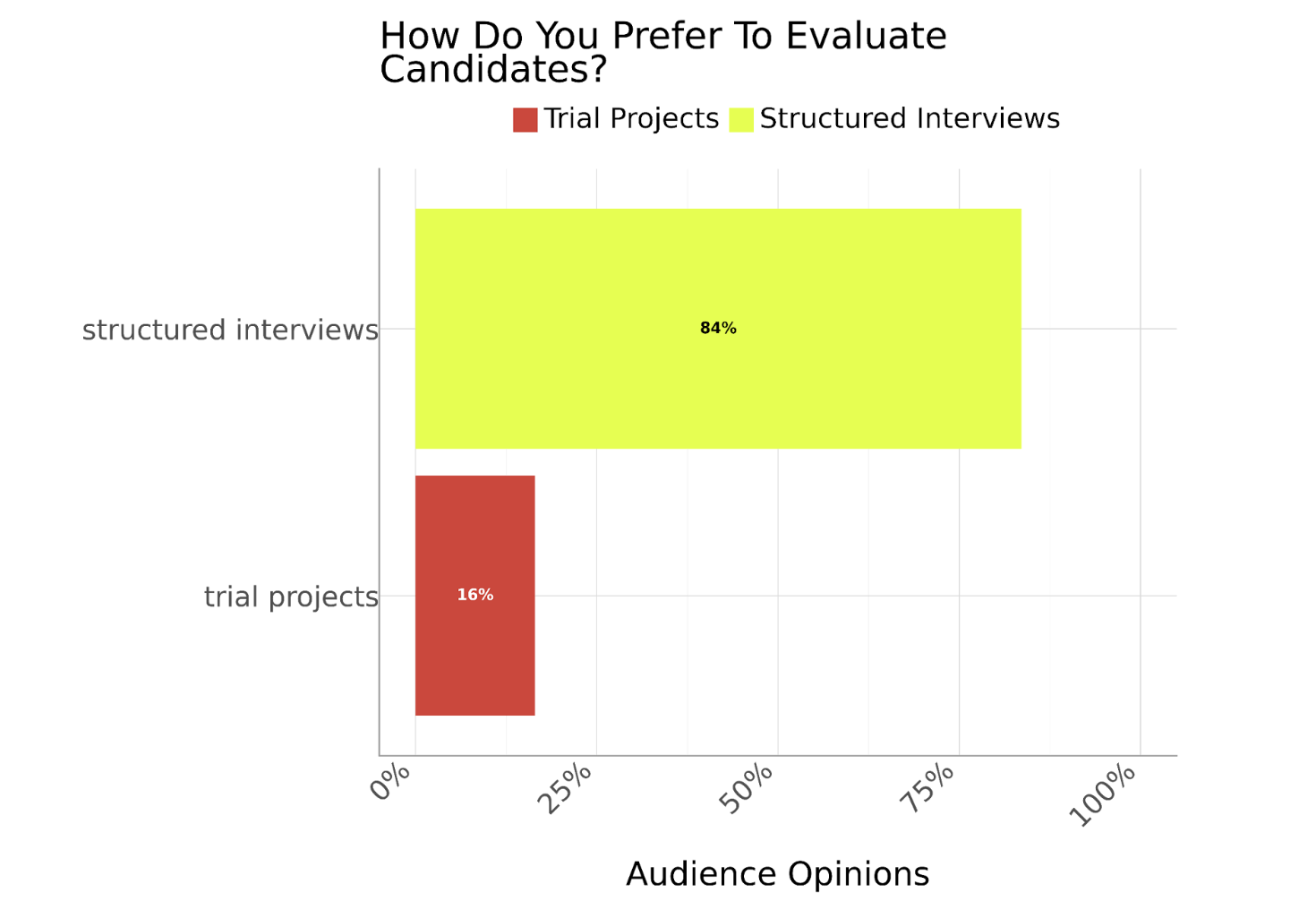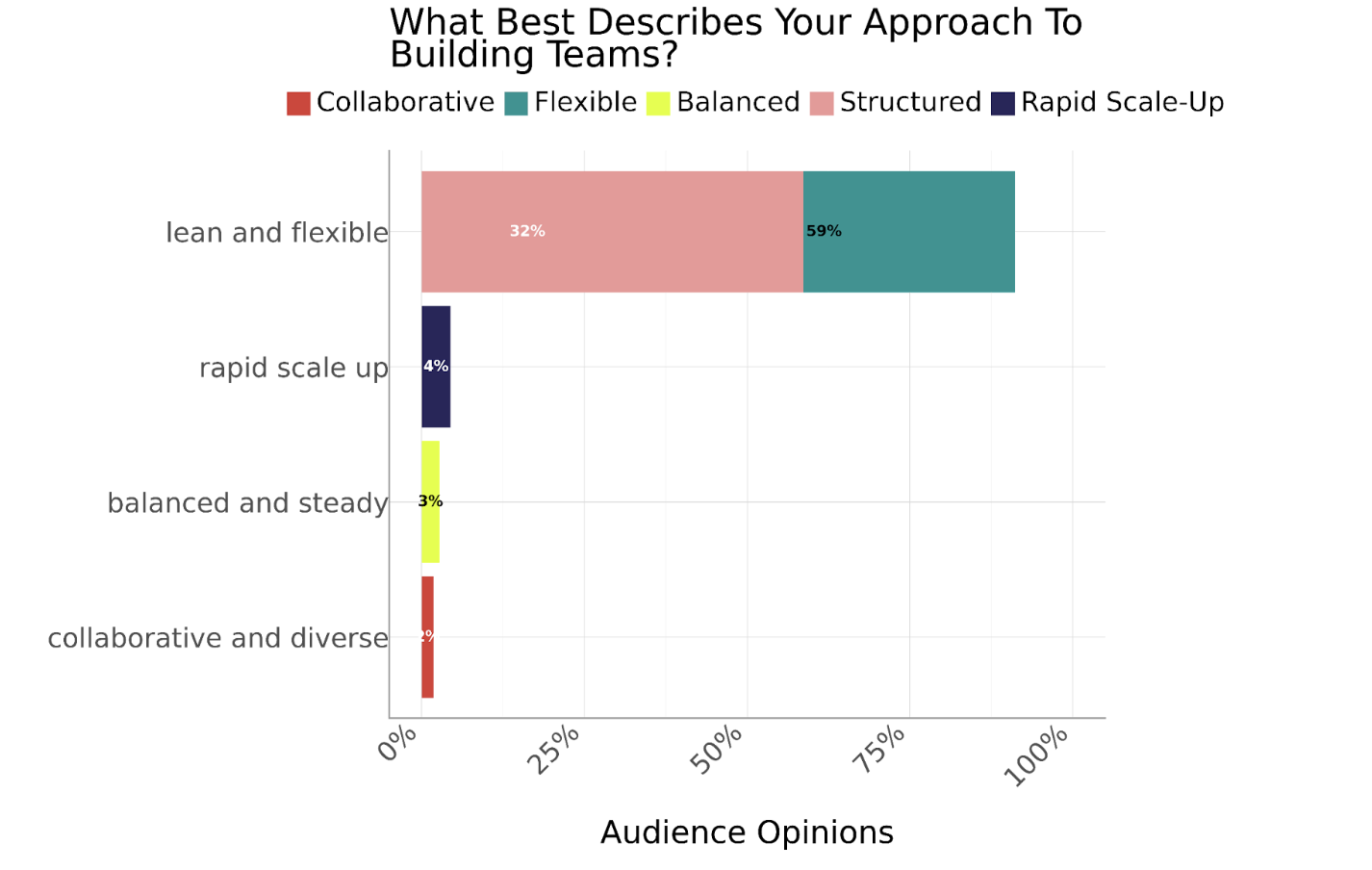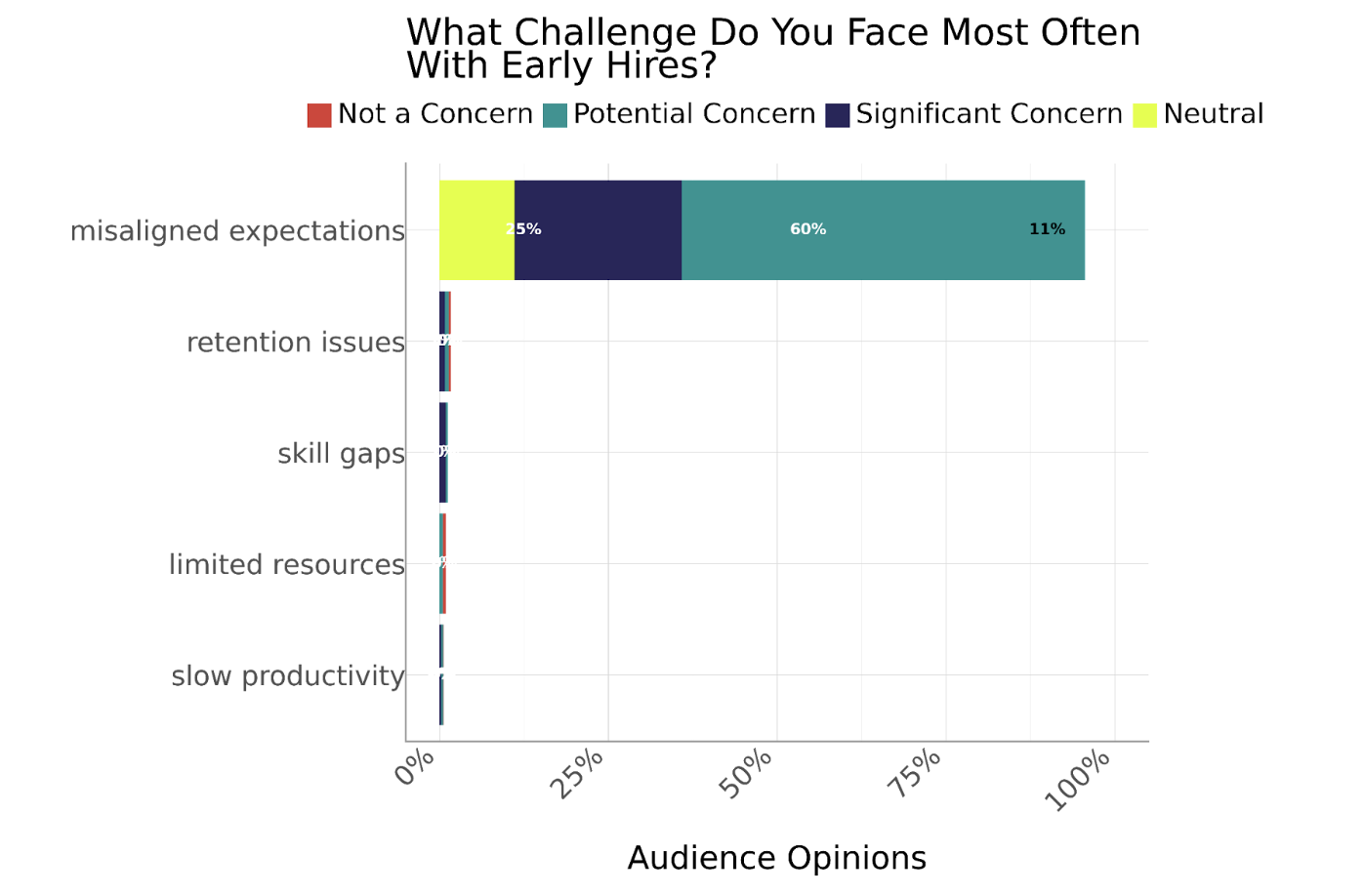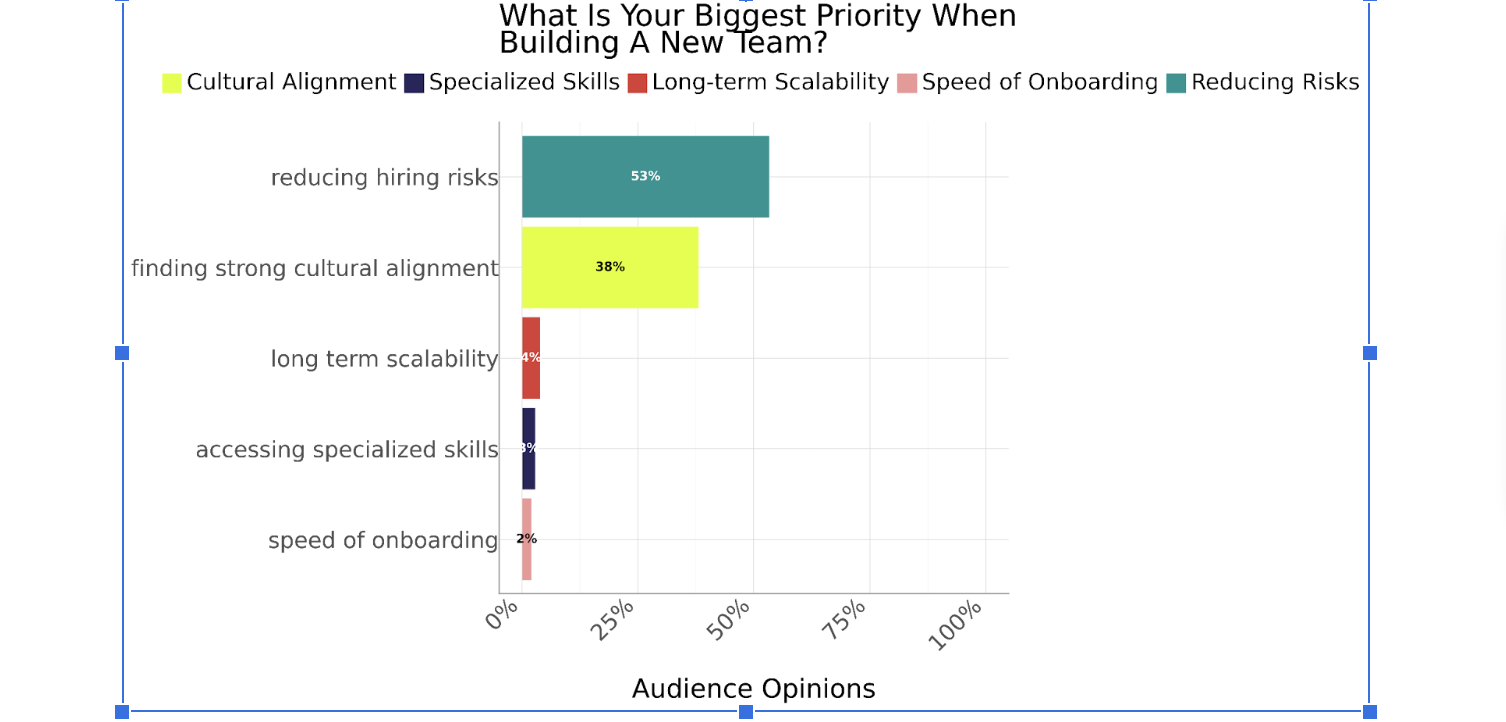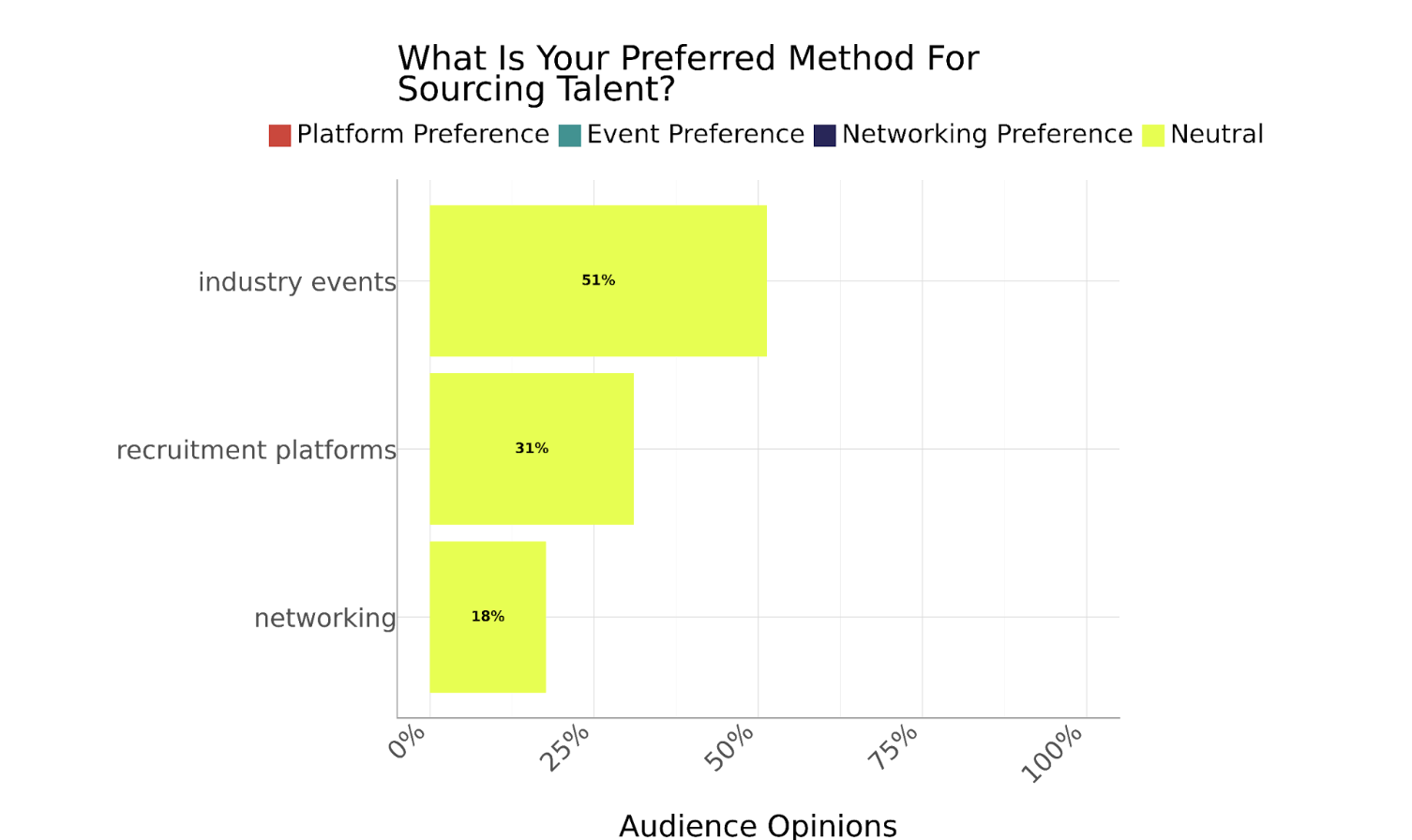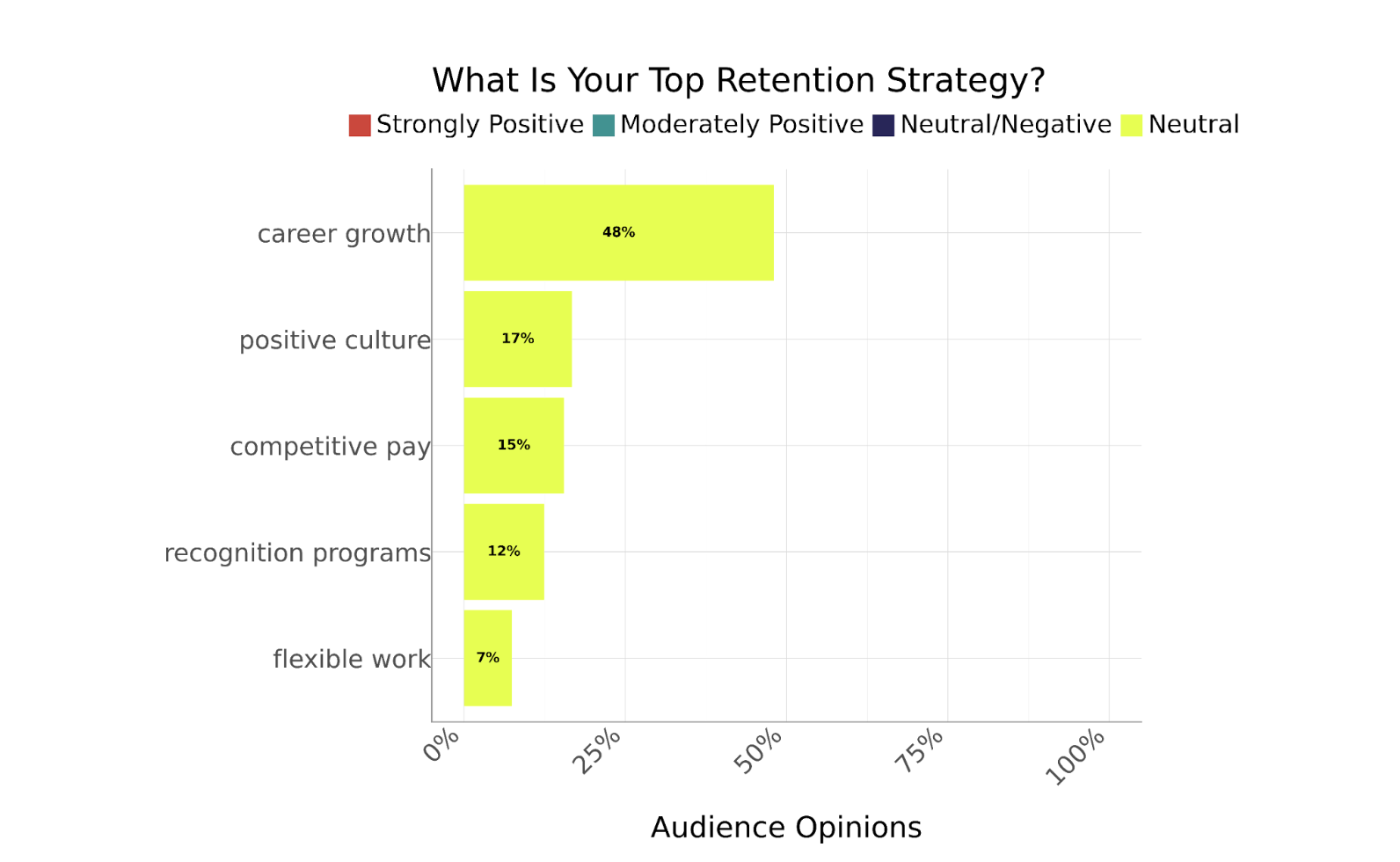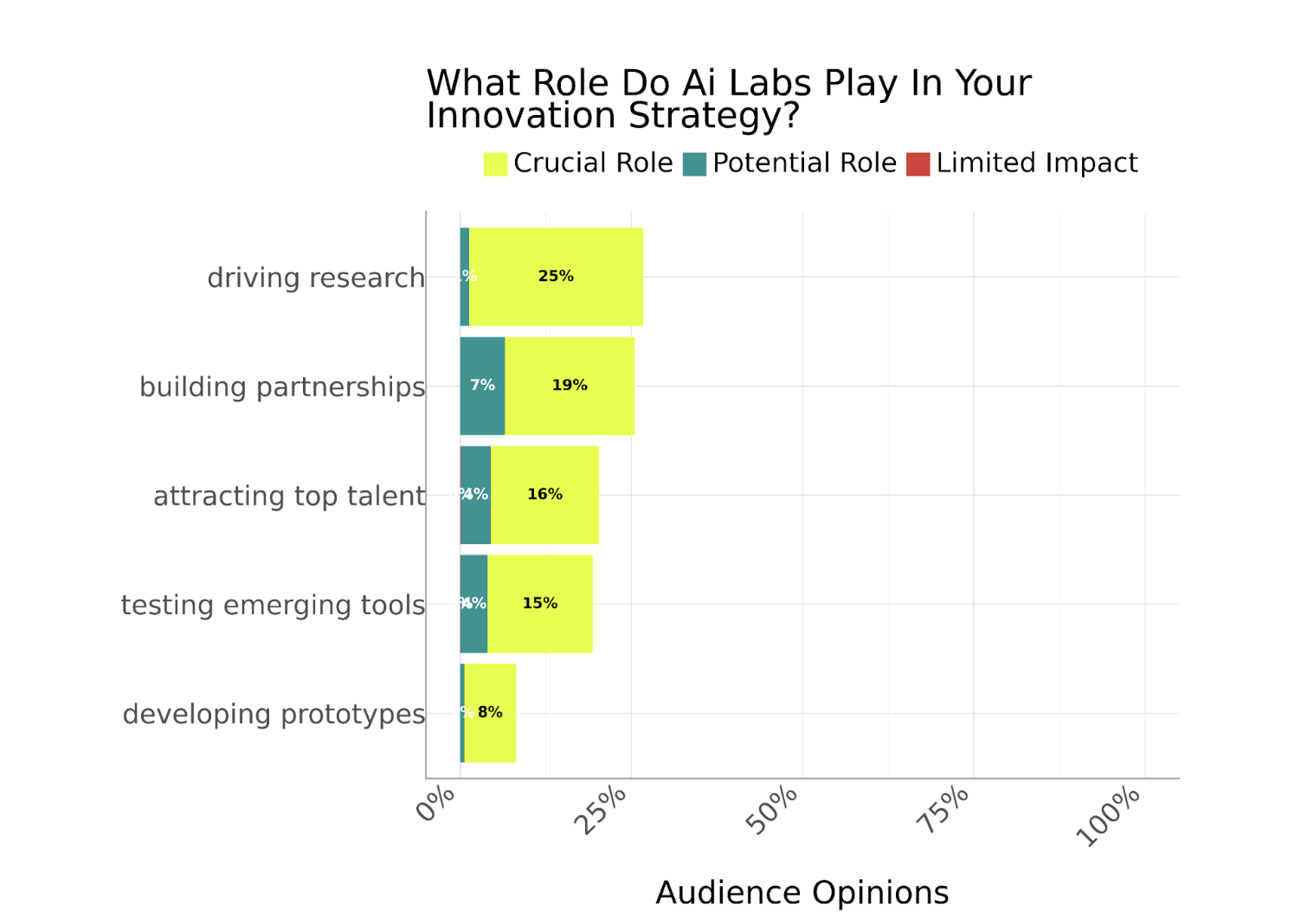Startup Tech Talent Statistics: USA 2025
Startups are characteristically driven by innovation, competition, and a relentless pursuit of top tech talent. With technology evolving at record speed, the ability to attract, integrate, and retain the right people has become just as critical as the products and ideas themselves. For startup leaders, this means success depends on building adaptable, collaborative teams that can thrive.
To find out what 10,852,230 tech leaders in startups in the US opinions were, we utilized AI-driven audience profiling to synthesize insights from online discussions for a full year, ending 29th September 2025, to a high statistical confidence level. Here’s what we found out about the current state of tech talent, according to those working in the sector.
Index
90% of tech leaders in startups say that team collaboration is essential for ensuring new talent integrates successfully
84% of tech leaders in startups prefer to evaluate candidates in structured interviews
47% of technology leaders in startups say that AI enhances recruitment strategies as it reduces hiring costs
88% of tech leaders in startups say that they are neutral about whether remote team members are useful for specialized roles
59% of tech leaders in startups say that being lean and flexible best describes their approach to building teams
Misaligned expectations with early hires are a potential concern for 60% of tech leaders in startups
42% of tech leaders in startups are neutral or uncertain about whether growth potential influences their hiring decisions
13% of tech leaders in startups are in the healthcare industry
59% of tech leaders in startups are moderately positive that collaboration is the most important quality in new hires
Reducing hiring risks is the biggest priority for 53% of tech leaders in startups when building a new team
51% of tech leaders in startups have neutral opinions about whether industry events are their preferred method for sourcing talent
48% of tech leaders in startups are neutral about whether career growth is their top retention strategy
An understanding of needs matters most in a recruitment partner for 77% of tech leaders in startups
AI labs play a crucial role in driving research in innovation strategies for 25% of tech leaders in startups
60% of tech leaders in startups highly value cybersecurity skills in new hires
38% of tech leaders in startups believe AI engineers will be highly important in the future
57% of tech leaders in startups have neutral opinions about whether team leads are the seniority level they recruit the most often
Negotiating offers is the most challenging stage of recruitment for 59% of tech leaders in startups
35% of tech leaders in startups view Silicon Valley as a strongly positive tech hub influence
14% of tech leaders in startups are located in Austin
Methodology
How Do You Ensure New Tech Talent Integrates Successfully?
90% of tech leaders in startups say that team collaboration is essential for ensuring new talent integrates successfully
One key factor stands out when integrating new hires:
Collaboration in the workplace is key to success, with studies showing that 70% of employees agree that it has a positive effect on productivity and time management. Our audience of tech leaders in startups clearly agrees, with 90% of them saying that team collaboration is essential for successfully integrating new talent into their roles.
Although ongoing mentorship is also incredibly valuable in the workplace, the fact that only 9% say that it’s essential to integration highlights just how crucial collaboration is. Additionally, just 1% say that regular feedback is essential, indicating that the majority of their priorities lie in fostering teamwork and open collaboration over more traditional, top-down management approaches.
How Do You Prefer To Evaluate Tech Candidates?
84% of tech leaders in startups prefer to evaluate candidates in structured interviews
Interviews clearly stand out as the best evaluation method:
For 84% of tech leaders in startups, structured interviews are the preferred method of evaluating candidates. This is understandable as research shows that structured interviews reduce bias, ensure equal evaluation, improve candidate compatibility, and focus on job-relevant skills.
In comparison, 16% of our audience say that they prefer to evaluate candidates using trial projects, showing that there’s still room for practical, hands-on assessments that reveal real-world problem-solving abilities and on-the-job performance potential.
How Do You See AI Affecting Your Tech Recruitment Strategy?
47% of technology leaders in startups say that AI enhances recruitment strategies as it reduces hiring costs
Sentiments about the use of AI in recruiting are largely positive:
AI has made significant inroads in nearly every industry, and it’s also impacting recruitment. For tech leaders in startups, opinions are largely positive about the role AI plays, with just under half (47%) stating that it enhances recruitment by reducing hiring costs.
A World Economic Forum study aligns with this, as studies have shown that utilizing conversational AI in hiring can result in an 87.64% reduction in costs when compared to traditional methods, proving its immense value. However, 22% of our audience say AI is ineffective in cost reduction, suggesting that they may not have tapped into its full potential as yet.
Another 8% of tech leaders in startups say that AI is creating new challenges, with 8% agreeing these are enhancing the recruitment process, while 10% argue that it complicates it. Opinions also differ on its impact on streamlining candidate screening, with 5% saying it enhances recruitment and 1% disagreeing.
Low opinion numbers were also noted for those who said it improved skill matching (4%) and those who said it complicated this element of recruitment (2%), and the less than 1% who said the same about enhancing or complicating global reach.
How Do You View Remote Team Members?
88% of tech leaders in startups say that they are neutral about whether remote team members are useful for specialized roles
Neutrality about remote workers is evident across the board:
In 2025, as many as 48% of employees work remotely, but for our audience, the way they view remote team members is entirely neutral.
88% mention them as useful for specialized roles, 22% as essential to scaling, and a mere 1% as suitable for short-term projects. Yet, these opinions are neither negative nor positive, revealing that they don’t see major advantages to remote work.
What Best Describes Your Approach To Building Teams?
59% of tech leaders in startups say that being lean and flexible best describes their approach to building teams
Agility is the main talking point when growing a team:
59% of tech leaders in startups all adopt the same best practices when growing their teams. They focus on being lean and flexible, while 32% of them take a more structured approach. In contrast, only 4% approach team building with a rapid scaling mindset, 3% with a balanced and steady approach, and 2% in a collaborative and diverse manner.
This highlights how most startups prioritize agility and adaptability over rapid expansion, valuing efficiency and responsiveness in their growth strategies to remain competitive in rapidly changing tech environments.
What Challenge Do You Face Most Often With Early Tech Hires?
Misaligned expectations with early hires are a potential concern for 60% of tech leaders in startups
One challenge stands out above the rest:
Misaligned expectations are the biggest and almost the only challenge our audience voices in connection with early hires. Opinions are split, with 60% saying this is a potential concern, 15% feeling neutral about it, and 11% stating that it's a significant concern.
In comparison, retention issues, skill gaps, limited resources, and slow productivity barely register, with 4% evenly distributed between them. With such a huge disparity, it’s evident that aligning expectations between founders and early hires is the primary concern that outweighs everything else.
What Factor Most Influences Your Tech Hiring Decisions?
42% of tech leaders in startups are neutral or uncertain about whether growth potential influences their hiring decisions
Various factors impact hiring decisions to different degrees:
In startups, growth potential is always a major focus, as success depends on the ability to scale quickly. For our audience, it influences hiring decisions, but perhaps not in the way you might think. 42% of tech leaders in startups say that they are neutral or uncertain about whether growth potential influences hiring, and only 5% say that it’s a priority.
Comparatively, recommendations hold more weight, with 19% saying they are a priority, yet balancing this out are the 12% who say they are neutral or uncertain about their impact. Cost efficiency is not a priority at all for 8%, but experience level is a priority for 14%, revealing that while growth potential and cost efficiency may take a back seat, experience and trusted recommendations remain the real drivers of hiring decisions.
What Industry Are You In?
13% of tech leaders in startups are in the healthcare industry
The majority of our audience is in unconfirmed industries:
For our audience, only 23% confirm that they are definitely in health tech (13%), fintech (7%), and ecommerce (3%), with another 3% saying they might also be in health tech. Those who might be in ecommerce also number 3%, followed by another 4% split two ways into those who might not be in this industry and those who are definitely not in it,while those in software development numbered less than 1%.
The majority of our audience of 10,852,230 tech leaders didn’t disclose their industry, with 67% falling into the “other” category. This is interesting as the four specific industries make up a large portion of the tech industry in the US, and the healthcare technology market size is set to be worth $1251.38 billion in 2029. However, it may be that tech leaders simply did not want to disclose their area of expertise when sharing opinions online.
What Is The Most Important Quality You Seek In New Tech Hires?
59% of tech leaders in startups are moderately positive that collaboration is the most important quality in new hires
What tech leaders look for in new hires isn’t always the same:
Once again, we see a strong focus on collaboration, with 59% of tech leaders in startups saying that it is a moderately important quality in a new hire and 31% that it’s strongly positive. Conversely, only 1% feel that it's a negative.
However, perhaps the most significant finding is that 2% of respondents say technical expertise is not a quality they look for in new hires, despite leading tech teams, and 1% say it is. Problem solving gets slightly better results, with 1% being moderately positive, and creativity is valued by 2%, but overall, collaboration is clearly the main talking point.
What Is Your Biggest Priority When Building A New Team?
Reducing hiring risks is the biggest priority for 53% of tech leaders in startups when building a new team
Clear priorities emerge when building a new team:
A bad hire can cost a business between $240,000 and $850,000 per employee or 30% of an employee's annual salary. With such huge costs having the potential to cripple a startup, it’s understandable that 53% of our audience state that reducing hiring costs is their biggest priority when building a new team.
Finding talent with a strong cultural alignment is the top priority for 38%, as this plays a major role in successful collaboration, while 4% focus on long-term scalability, 3% on accessing specialized skills, and 2% on the speed of onboarding. These priorities show that startup leaders are thinking strategically about sustainability rather than short-term gains.
What Is Your Preferred Method For Sourcing Tech Talent?
51% of tech leaders in startups have neutral opinions about whether industry events are their preferred method for sourcing talent
There’s no clear preferred method for finding talent:
Sourcing talent is undeniably one of the most crucial elements of running any startup, so the fact that our audience is neutral regarding their preferred method for sourcing new hires stands out. Opinions are split three ways, with 51% expressing neutral opinions about industry events, 31% about recruitment platforms, and 18% networking.
This makes it abundantly clear that startups are still very much exploring which recruitment channels deliver the best results.
What Is Your Top Retention Strategy?
48% of tech leaders in startups are neutral about whether career growth is their top retention strategy
Once again, neutral opinions are expressed:
Gallup studies have shown that replacing an employee costs between half and twice an employee’s annual salary, making retention valuable, especially for a startup. But our audience is entirely neutral about their top retention strategies, although the numbers who mention different approaches do vary.
Nearly half (48%) mention career growth, while positive culture is mentioned by 17%, competitive pay by 15% and recognition programs by 12%.
Despite the popularity and demand for flexibility in the workplace, only 7% express any opinions about flexible work as a retention strategy, showing that this isn’t something they feel will keep employees on board.
What Matters Most In Your Tech Recruitment Partners?
An understanding of needs matters most in a recruitment partner for 77% of tech leaders in startups
What really matters stands out:
For 77% of our audience, having a recruitment partner that understands their needs is what matters most.
This far exceeds the quality of candidates (12%), strong communication (9%), and having a long-term partnership (2%), proving that the best recruitment partners are those that truly grasp the unique challenges, goals, and culture of the startups they support.
What Role Do AI Labs Play In Your Innovation Strategy?
AI labs play a crucial role in driving research in innovation strategies for 25% of tech leaders in startups
AI labs are impacting innovation strategies in numerous ways:
AI labs are playing an integral role in innovation strategies, and for our audience, they’re having a major impact in five different areas. The biggest is in driving research, with 25% saying these labs play a crucial role and 1% saying they will play a potential role. 19% and 7% feel the same about AI labs building partnerships, and 1% and 4% agree that it impacts attracting top talent.
For 15%, AI labs play a crucial role in testing emerging tools, and 4% see their potential, while 8% say they're crucial in developing prototypes, and 1% see the potential. It’s clear that there are many uses for AI labs already, and that leaders also see the potential applications for them.
What Tech Skill Stack Do You Value Most In New Hires?
60% of tech leaders in startups highly value cybersecurity skills in new hires
New talent needs valuable skills in specific areas:
Cybersecurity is clearly the tech skill stack tech leaders in startups value the most, with 60% saying it’s highly valued and 16% moderately valued compared to just 2% who say it's not valued. Considering IBM confirms that the average data breach in the US costs a business $4.4 million, this focus is understandable.
Data analytics comes far behind in second place, with 8% saying it’s a highly valued skill, followed by cloud infrastructure with 3% placing high value on it, 2% moderate value, and 1% not valuing it at all.
Full stack development and mobile application skills were largely evenly split, with both being highly valuable for 2% of our audience, and moderately valued for 1%, while under 1% for each said these skills were not valued at all. Based on these numbers, it’s very clear what type of talent tech leaders are looking for.
Which Tech Roles Do You Believe Will Become More Important In The Future?
38% of tech leaders in startups believe AI engineers will be highly important in the future
AI leads the way for future talent searches:
For our audience, AI engineers are tipped to be the most important role in the future, with 38% saying they are highly important and 30% potentially important. This reflects current trends, as this career is already experiencing a 20.17% growth, and is a rewarding, fast-paced career with higher salaries, making it a good choice.
Product managers take the second spot, with 16% saying they will be highly important and 5% potentially so. Cybersecurity analysts also feature, albeit with 9% saying they will be highly important, followed by data scientists with just 1%, and UX designers, with another 1% sharing the same opinion on their importance level.
Which Seniority Level Do You Recruit Most Often?
57% of tech leaders in startups have neutral opinions about whether team leads are the seniority level they recruit the most often
Opinions on seniority hires remain neutral:
Based on the opinions synthesized, it’s evident that there’s no standout level of seniority that tech leaders recruit the most often. However, neutral opinions do differ in volume, with 57% for team leads, 40% for executive roles, and 3% for entry-level roles. This gives some indication as to what tech leaders are looking for in their startups.
Which Stage Of Tech Recruitment Do You Find Most Difficult?
Negotiating offers is the most challenging stage of recruitment for 59% of tech leaders in startups
Some challenges are bigger than others when recruiting tech talent:
Negotiating offers stands out as the biggest challenge for tech leaders, with 59% of those in startups saying that it's challenging compared to 19% who say the opposite. Far behind are those who find attracting candidates and screening candidates challenging (3% each), and the same percentage who don't find this part challenging at all.
Interviewing candidates isn't a challenge for a further 4%, while 1% say it is, and 5% say retaining employees isn't challenging either. This indicates that for most tech leaders, the real pressure point lies not in sourcing or retaining talent but in closing the deal.
Which Tech Hubs Do You View As The Most Influential?
35% of tech leaders in startups view Silicon Valley as a strongly positive tech hub influence
One tech hub is leading the way:
Silicon Valley is considered the most influential tech hub for 35% of our audience, while 63% are neutral about its influence, and 1% feel strongly negative about it. When it comes to other influential tech hubs, opinions barely register, with the remaining 1% split across New York, Seattle, Austin, and Boston. As Silicon Valley accounts for nearly 50% of the US’s venture capital funding, it’s understandable that it takes the lead for startups, leaving all other hubs in the dust.
Which City Are You Located In?
14% of tech leaders in startups are located in Austin
Our audience is scattered across the US:
Although Silicon Valley leads the way as the most influential tech hub, the highest number of tech leaders in our audience are based in Austin. 14% are definitely located here, 23% possibly, 9% possibly not, and only 2% definitely not. Despite its influence, just 4% are definitely located in Silicon Valley, 11% possibly, 7% possibly not, and 1% definitely not.
6% are definitely located in New York, and another 6% possibly so, while 7% are possibly in Boston, and 3% are definitely located in this city. Seattle also has some presence, with 4% definitely located there, 2% possibly, and 1% possibly not. As Austin has been named as the best US city to start a business, its place in the lead makes sense.
Overall, these statistics paint a very clear picture of the priorities, challenges, and mindsets shaping startup tech leadership in 2025. From valuing collaboration and flexibility to embracing AI-driven recruitment and prioritizing cybersecurity skills, it’s evident that startup leaders are focused on sustainable growth, innovation, and building agile, high-performing teams for the future.
Methodology
Sourced using Artios from an independent sample of 10,852,230 United States tech leaders in startups' opinions across X, Reddit, TikTok, LinkedIn, Threads, and BlueSky. Responses are collected within a 95% confidence interval and 1% margin of error. Results are derived from opinions expressed online, not actual questions answered by people in the sample.
About the representative sample:
42% of US tech leaders in startups are between the ages of 45 and 64.
57% identify as male and 43% as female.
54% earn between $200,000 and $500,000 annually.

